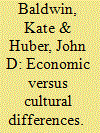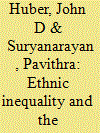| Srl | Item |
| 1 |
ID:
105193


|
|
|
|
|
| Publication |
2010.
|
| Summary/Abstract |
Arguments about how ethnic diversity affects governance typically posit that groups differ from each other in substantively important ways and that these differences make effective governance more difficult. But existing cross-national empirical tests typically use measures of ethnolinguistic fractionalization (ELF) that have no information about substantive differences between groups. This article examines two important ways that groups differ from each other-culturally and economically-and assesses how such differences affect public goods provision. Across 46 countries, the analysis compares existing measures of cultural differences with a new measure that captures economic differences between groups: between-group inequality (BGI). We show that ELF, cultural fractionalization (CF), and BGI measure different things, and that the choice between them has an important impact on our understanding of which countries are most ethnically diverse. Furthermore, empirical tests reveal that BGI has a large, robust, and negative relationship with public goods provision, whereas CF, ELF, and overall inequality do not.
|
|
|
|
|
|
|
|
|
|
|
|
|
|
|
|
| 2 |
ID:
146463


|
|
|
|
|
| Contents |
Why does ethnicity become a salient element of electoral politics in some places but not others? The authors argue that in majoritarian systems, ethnic identity is most salient to electoral behavior when there are high levels of inequality between ethnic groups. Theytest this argument in the Indian states and find that state-level party system ethnification is strongly correlated with economic inequality between groups, a pattern they also find in cross-national data. Theyalso show that in India, when income differences between groups increase, the groups tend to support different parties. The analysis reveals a strong class component to ethnic politics in India, underscoring the possibility that what scholars often view as identity politics can have an element of class politics in disguise.
|
|
|
|
|
|
|
|
|
|
|
|
|
|
|
|